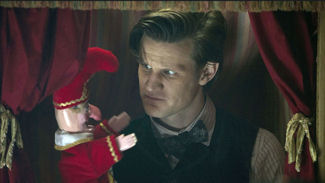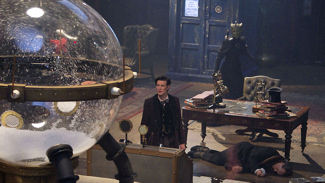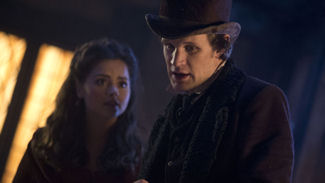There's a very old man who cannot die, and his business has always been saving the world...until now.Now he has withdrawn from that world, having sacrificed one of his dearest protegées in saving it. Now he lives in a gleaming white palace on top of a cloud, and he no longer involves himself with the affairs of mortals.
However, he does have agents doing his work on Earth, most of whom are not quite human, though they can pass for it when people don't really pay attention to the evidence of their eyes and ears. And if you can pass along a message to this great and powerful man through his agents, a very special kind of message, you might just convince him not only to come down from his cloud and help you, but perhaps even invite you up. Especially if you are Mary Poppins.
So that's the Doctor Who Christmas special in a nutshell. This time around it's not based on one particular work of literature, but instead comes as a special soufflé flavored with Mary Poppins, Sherlock Holmes, and, arguably, the Bible.
Oddly, it's the Holmes stuff that works the least. There's not much of a mystery here, for starters, particularly since the villain is absurdly fond of monologuing, but also the three Holmes references are stuffed in so awkwardly, and all three stretch credibility to the breaking point. The non sequitur about Madame Vastra and her wife Jenny being the inspiration for Doyle's creation of Holmes might have been a cute gag if the pair of them had actually done any deduction that would make it a remotely likely comparison.
 The scene where the Doctor dons a deerstalker is gratuitous even in story terms, and his Holmes send-up is a mystifyingly offhanded wisecracking cross between Jim Carrey and Neil Patrick Harris. (This sits in contrast to Smith's Classic Who antecedent, Tom Baker, who played Holmes in a BBC production and wore the Holmes outfit as the Fourth Doctor in "The Talons of Weng-Chiang" with much more style and much less "look at me! Hilarious, right?")
The scene where the Doctor dons a deerstalker is gratuitous even in story terms, and his Holmes send-up is a mystifyingly offhanded wisecracking cross between Jim Carrey and Neil Patrick Harris. (This sits in contrast to Smith's Classic Who antecedent, Tom Baker, who played Holmes in a BBC production and wore the Holmes outfit as the Fourth Doctor in "The Talons of Weng-Chiang" with much more style and much less "look at me! Hilarious, right?")
And then, further diluting the previous references, Strax the comedy Sontaran teasingly calls the Doctor "Sherlock Holmes" after the pointless disguise routine, just for some odd banter. It's as if Moffat knew that sooner or later he'd be unable to resist reminding people of the other iconic British character he's been reimagining, and added the references without a thought to whether they'd contribute anything to the story.
The Mary Poppins bites work a bit better. It's fun to watch Clara the barmaid putting on a posh accent to be the "very pretty" governess to a pair of lonely children whose father longs to love (his children, a new wife) but can't get past his own stiff, frozen exterior. It's fun to watch Clara the new companion meet cute with the Doctor, and to follow her dogged attempts to track him down, based—as far as we know—on a mixture of instant curiosity, instant attraction, and the need to fight the danger threatening the children she governs.
I was strangely reminded of Jo Grant, companion to the Third Doctor in the 70s, who underneath a bubbly exterior had a similar determination and quick wit for getting into and out of trouble. I'm a little disappointed that in a show whose chief virtue is its ability to change on a dime, the new companion is yet another beautiful white girl in her twenties, but Jenna Louise-Coleman has great chemistry with Matt Smith and the two of them should be great together.
 'Nuff said already about the theological allusions, but let's talk about this sulking on a cloud business. We're meant to feel that grief and guilt have knocked this incarnation of the Doctor reeling in a different direction than they have in the past: that he's given up adventuring because an ungrateful universe robbed him of his two best friends well before old age would have, and that he now tries not to get involved with anyone.
'Nuff said already about the theological allusions, but let's talk about this sulking on a cloud business. We're meant to feel that grief and guilt have knocked this incarnation of the Doctor reeling in a different direction than they have in the past: that he's given up adventuring because an ungrateful universe robbed him of his two best friends well before old age would have, and that he now tries not to get involved with anyone.
It's not clear how long he's been doing this, or what "doing this" actually means, because he seems to be lodging permanently above Victorian London, and none of his pseudocompanions seem to have aged at all since we last saw them in "A Good Man Goes To War."
Given Vastra's species and Strax's apparent resuscitation, we could probably concoct a geeky fan theory about their longevity here, but Jenny puts a stop to that: she's human, so the sulk can't have lasted more than five years or so from her perspective. If it had been a long one, that would explain the Men In Black-esque memory worm and the gimmicky "one-word test" Vastra has ready to administer to Clara (how many people have undergone the test before? under what circumstances? is the point just to see if the new companion will be cleverer than Amy and Rory were, and perhaps better suited to survive?). But if it had been a short one, that would explain why the Doctor's personality seems very little changed from what we remember.
It really does feel more like a relatively brief sulk than anything lasting and deep that would require reimagining who the Doctor is when he's not saving the world, which is a shame. It might not have made this special more fun, but it would have made it more interesting.
As with last year's special, there's a classic-series-fan Easter egg here in the form of the Great Intelligence, a disembodied entity first seen in two 60s stories ("The Abominable Snowmen" and "The Web of Fear"), animating armies of big furry Yeti rather than telepathic ice.
The Doctor's "rings a bell" comments at the end of the story imply that this is the same entity which he will go on to encounter in those stories in the Intelligence's future and his own past. It seems strange that the bell didn't ring earlier for him, but he's a little rusty, and while those adventures were less than 50 years ago for us, they were centuries ago for him. Or maybe this villain just isn't interesting enough to register.
 Mr. Simeon, a one-dimensional character Richard E. Grant (who has portrayed the Doctor before twice in non-canonical productions) could have played in his sleep, has apparently been cultivating a vague sociopathic streak for at least 50 years and has only now gotten around to mobilizing his army of snowmen to, yawn, conquer the world.
Mr. Simeon, a one-dimensional character Richard E. Grant (who has portrayed the Doctor before twice in non-canonical productions) could have played in his sleep, has apparently been cultivating a vague sociopathic streak for at least 50 years and has only now gotten around to mobilizing his army of snowmen to, yawn, conquer the world.
With a more interesting backstory like Michael Gambon got in "A Christmas Carol," Grant could almost certainly have done something extraordinary with the role, but as is the threat seems hollow and the snowmen (yet another monster you can defeat if you just disbelieve in it hard enough) are literally a child's idea of what would be scary.
Which brings us to the last things we can discuss before we get into spoiler territory: the new TARDIS "desktop wallpaper" and the new title sequence, both of which have been updated with classic elements. The TARDIS gets a more austere, less steampunk-via-E.T. makeover in gray and white, and though all the blinking lights push things uncomfortably into Star Trek territory, its funereal air fits the mood of the episode much better than the old one would have. The titles are going to put off some new fans, I'm sure, but I appreciate the new musical touches and the nods to the past (Matt Smith's face, and most especially the early-70s-Who red time tunnel effect at the end).
So, spoilers.
Clara isn't the new companion, and yet apparently she is. It's a pretty marvelous fake-out that I didn't see coming a second time, especially with the Doctor's lines suggesting that "Soufflé Girl" had to survive this story in order to eventually become a Dalek in "Asylum of the Daleks."
 Instead it appears that he will actually meet her twenty-first century self and, unless this is another fakeout and we're in for a succession of "oh my god! they killed Oswin! you bastards!" stories, yet another modern companion (rather than the first Victorian companion since 1968) is what we're getting. How we get her is another question.
Instead it appears that he will actually meet her twenty-first century self and, unless this is another fakeout and we're in for a succession of "oh my god! they killed Oswin! you bastards!" stories, yet another modern companion (rather than the first Victorian companion since 1968) is what we're getting. How we get her is another question.
Why are there so many Claras (at least three, perhaps more)? Why have the first two given the Doctor the same cryptic message ("Run, you clever boy, and remember")? Is she splintered through time? Does she reincarnate? That might be a nice antidote to the Doctor's apparent worry that humans are too fragile; the companion who dies but reappears seems to be exactly what he wants for Christmas from the universe (but then again, isn't that what Amy and Rory kept doing, right up until they stopped doing it anymore?). Is she even human, or something else entirely?
It's yet another grabber of a mystery, presumably our season arc for early 2013 and maybe beyond. It's also the first Christmas special we've had from Moffat that's not pretty much self-contained, but instead, like the RTD specials, promises interesting things to come. And this Christmas, that's exactly what I wanted.

 The scene where the Doctor dons a deerstalker is gratuitous even in story terms, and his Holmes send-up is a mystifyingly offhanded wisecracking cross between Jim Carrey and Neil Patrick Harris. (This sits in contrast to Smith's Classic Who antecedent, Tom Baker, who played Holmes in a BBC production and wore the Holmes outfit as the Fourth Doctor in "The Talons of Weng-Chiang" with much more style and much less "look at me! Hilarious, right?")
The scene where the Doctor dons a deerstalker is gratuitous even in story terms, and his Holmes send-up is a mystifyingly offhanded wisecracking cross between Jim Carrey and Neil Patrick Harris. (This sits in contrast to Smith's Classic Who antecedent, Tom Baker, who played Holmes in a BBC production and wore the Holmes outfit as the Fourth Doctor in "The Talons of Weng-Chiang" with much more style and much less "look at me! Hilarious, right?")
 'Nuff said already about the theological allusions, but let's talk about this sulking on a cloud business. We're meant to feel that grief and guilt have knocked this incarnation of the Doctor reeling in a different direction than they have in the past: that he's given up adventuring because an ungrateful universe robbed him of his two best friends well before old age would have, and that he now tries not to get involved with anyone.
'Nuff said already about the theological allusions, but let's talk about this sulking on a cloud business. We're meant to feel that grief and guilt have knocked this incarnation of the Doctor reeling in a different direction than they have in the past: that he's given up adventuring because an ungrateful universe robbed him of his two best friends well before old age would have, and that he now tries not to get involved with anyone.
 Mr. Simeon, a one-dimensional character Richard E. Grant (who has portrayed the Doctor before twice in non-canonical productions) could have played in his sleep, has apparently been cultivating a vague sociopathic streak for at least 50 years and has only now gotten around to mobilizing his army of snowmen to, yawn, conquer the world.
Mr. Simeon, a one-dimensional character Richard E. Grant (who has portrayed the Doctor before twice in non-canonical productions) could have played in his sleep, has apparently been cultivating a vague sociopathic streak for at least 50 years and has only now gotten around to mobilizing his army of snowmen to, yawn, conquer the world.
 Instead it appears that he will actually meet her twenty-first century self and, unless this is another fakeout and we're in for a succession of "oh my god! they killed Oswin! you bastards!" stories, yet another modern companion (rather than the first Victorian companion since 1968) is what we're getting. How we get her is another question.
Instead it appears that he will actually meet her twenty-first century self and, unless this is another fakeout and we're in for a succession of "oh my god! they killed Oswin! you bastards!" stories, yet another modern companion (rather than the first Victorian companion since 1968) is what we're getting. How we get her is another question.





